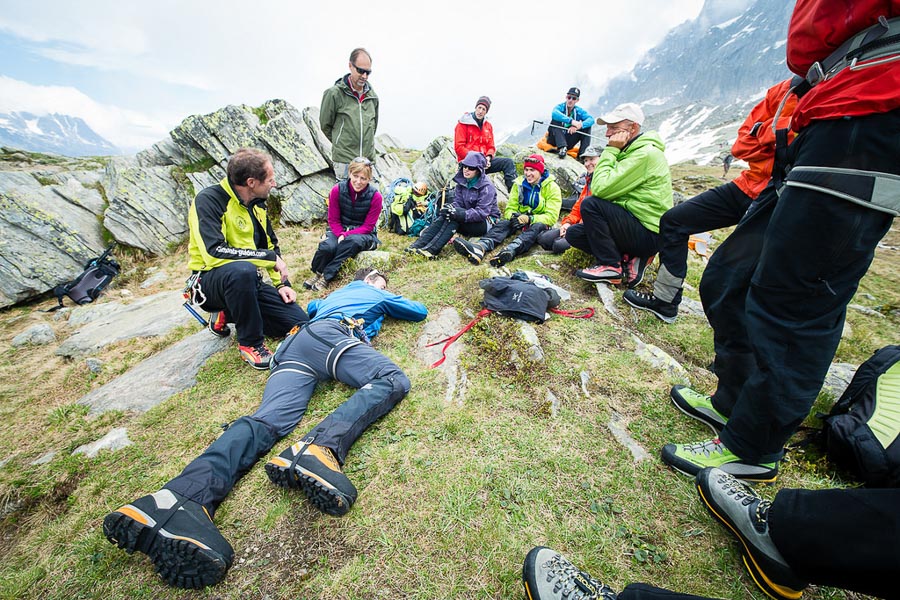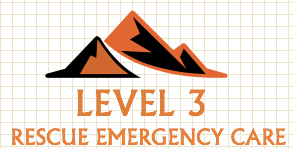Course Options

Mountain First Aid
MOUNTAIN FIRST AID Candidates must hold a current REC Level 2 or higher to attend. A two day emergency care course bolt on specifically for mountains. The course is designed to introduce and enhance a systematic management system of casualties in the outdoor environment. Topic learning and practicals intermixed with scenarios of real situations. The course includes: The fundamental workings of the body, in particular the heart, lungs and airway Assessing a casualty in a difficult enviornment. Introduces a system to cope with all incidents as safely as possible Deciding how to deal with an accident or incident Awareness of delayed medical help and adverse environmental conditions
First Aid - Afloat
First Aid - Afloat Our one-day course covers all the usual first aid subjects, but from a boating perspective. It is aimed at anyone who goes afloat, whether on inland waters, rivers, estuaries or on cross channel passages. In a medical emergency a little first aid knowledge and immediate action can save lives, especially in remote locations. This one-day course is designed to provide a working knowledge of first aid for people using small craft and to support skippers. It fulfils the requirements for: professional skippers of small craft working within 60 miles of a safe haven,; ISA Instructors The subjects specific to boating include: the recovery position in a confined space CPR, including the drowning protocol cold shock and hypothermia fromimmersion and/or exposure seasickness and dehydration medical assistance or advice by VHF helicopter rescue
BLAST_Babysitter Lessons & Safety Training
BLAST BLAST! (Babysitter Lessons and Safety Training) is an important training program for potential babysitters and parents considering hiring a babysitter. The BLAST! program is exciting and interactive, providing extensive training in pediatric first aid, household safety, and the fundamentals of childcare. Designed for people ages 13 and older, their parents, and parents looking to hire a babysitter, the BLAST! program can prepare children to interview for a babysitting job, select safe and suitable games and activities, prevent accidents, perform first aid, and begin babysitting safely and competently. The BLAST program features: -The babysitter basics, including feeding, burping a baby, spoon-feeding, crying, preparing for bed, behavioral problems, and discipline. -First aid basics for emergency response.

Manual Handling
The Regulations set out a framework for employers to avoid or reduce the risk of injury resulting from manual handling activities. The basic principle enshrined in this Part is that where manual handling of loads which involves a risk of injury (particularly to the back) is present, the employer must take measures to avoid or reduce the need for such manual handling. The definition of manual handling in Regulation 68 refers to activities where the characteristics of the load pose a risk and the ergonomic conditions of the activity are unfavourable. Regulation 69(c) requires that a risk assessment be carried out on all work tasks which involve manual handling activity. The risk assessment process should ensure that these activities are assessed to identify risk factors and to decide on appropriate control measures, including both engineering and organisational, to avoid or reduce the risk of musculoskeletal injury. This assessment should critically review manual handling operations. Full compliance with the requirements of Regulation 69 means that the employer completes a risk assessment of manual handling tasks in consultation with relevant staff, records the results of the risk assessment in a suitable documented format, puts appropriate control measures in place to avoid or reduce manual handling Manual Handling of Loads Regulations 2007 5 Manual Handling with tables:Layout 1 30/11/2007 11:28 Page 5 activities and communicates the findings of the risk assessment to relevant staff

REC Skills - Facilitator
Rescue Emergency Care Skills. This award is specifically designed to meet the Emergency Care Skills requirement for Adventure Settings How to evaluate a scene Understand the first-aid needs to consider on outings Radio Comminucation Basic first-aid kit and skills needed for advancement Fire Extinguisher use and management Medivac & Communications This award can only be undertaken as an add on module to an existing Emergency Care Award.
ICE MODULE 2
ICE – Immersion & Cold Emergencies Emergency Care for Drowning, Cold and Immersion incidents All ICE MODULES are focused on dealing with water-based incidents in a pre-hospital setting such as drowning, hypothermia, casualty rescue and post-rescue collapse. The emphasis is on managing and treating casualties using minimal medical and survival equipment pre the arrival of better equipped medical teams. The ICE MODULES focus on developing practical skills in line with current clinical practice guidelines. Students gain hands-on experience through both classroom practical’s and outdoor scenarios. Casualty recovery and management skills form part of this course. While the course can be tailored to meet the requirements of special interest groups it is specifically designed for those who operate in or around water such as SAR personnel, lifeguards, paddle sport instructors, medics, water sports enthusiasts and mountain leaders. There are three ICE modules ranging from BASIC to ADVANCED. ICE MODULE 1 - BASIC – ONE DAY ) ICE MODULE 2 - INTERMEDIATE – TWO DAY ICE MODULE 3 – ADVANCED – TWO DAY
ICE MODULE 3
ICE – Immersion & Cold Emergencies Emergency Care for Drowning, Cold and Immersion incidents All ICE MODULES are focused on dealing with water-based incidents in a pre-hospital setting such as drowning, hypothermia, casualty rescue and post-rescue collapse. The emphasis is on managing and treating casualties using minimal medical and survival equipment pre the arrival of better equipped medical teams. The ICE MODULES focus on developing practical skills in line with current clinical practice guidelines. Students gain hands-on experience through both classroom practical’s and outdoor scenarios. Casualty recovery and management skills form part of this course. While the course can be tailored to meet the requirements of special interest groups it is specifically designed for those who operate in or around water such as SAR personnel, lifeguards, paddle sport instructors, medics, water sports enthusiasts and mountain leaders. There are three ICE modules ranging from BASIC to ADVANCED. ICE MODULE 1 - BASIC – ONE DAY ) ICE MODULE 2 - INTERMEDIATE – TWO DAY ICE MODULE 3 – ADVANCED – TWO DAY
Rescue Emergency Care Level 1
RESCUE EMERGENCY CARE LEVEL 1 A one-day course (6 hours). The basic first aid course is designed to introduce a systematic way of first aid for managing casualties. Topic learning and practical’s intermixed with scenarios of real situations. The Content: The fundamental workings of the body, in particular the heart, lungs and airway Recognising the difference between the healthy, ill or injured Ability to record the baseline measurements of the vital body functions Introduces a system to cope with all incidents as safely as possible Deciding how to deal with an accident or incident The Candidates All candidates entering the Rescue Emergency Care scheme start with the basic first aid module. The Qualification The REC Level 1 course is certified for two years
Rescue Emergency Care Level 2
REC LEVEL 2 [Emergency Course] A two day course (16 hours). The emergency first aid course is designed to introduce a systematic way of first aid for managing casualties. Topic learning and practicals intermixed with scenarios of real situations. The course includes: The fundamental workings of the body, in particular the heart, lungs and airway Assessing a casualty Introduces a system to cope with all incidents as safely as possible Deciding how to deal with an accident or incident Awareness of delayed medical help and adverse environmental conditions The Content First aid training with the REC scheme is easy and fun. The course is progressive by building on each session, introducing new scenarios to test all techniques for: Emergency: vital signs • emergency action • airway • unconscious • choking • bleeding • breathing and circulation • cpr Environment: heat stress • cold stress • hot injuries • cold injuries Illness: chest pain • stroke • asthma • epilepsy • diabetes Injury: head • spine • chest • abdomen • pelvis • bones • soft tissue • eye Rescue: transportation • communication The Candidates All candidates entering the REC scheme start with the emergency first aid module

Rescue Emergency Care Level 3
RESCUE EMERGENCY CARE LEVEL 3 The course is ideal for those working or playing in the outdoors. The REC3 course is designed to introduce a systematic method of first aid for managing casualties. The course is a balance of learning and practical intermixed with scenarios of real situations. The Content: First aid training with the REC scheme is easy and fun. The course is progressive by building on each session, introducing new scenarios to test all techniques for: Emergency: vital signs • emergency action • airway • unconscious • choking • bleeding • breathing and circulation • cpr Environment: heat stress • cold stress • hot injuries • cold injuries Health & Safety: recording accidents • • first aid kits Illness: chest pain • stroke • asthma • epilepsy • diabetes • minor ailments Injury: head • spine • chest • abdomen • pelvis • bones • soft tissue • eye Rescue: transportation • communication Assessment: reviews learning during course • practical assessment The Candidates Will be able to take control of an incident until a nurse, doctor or ambulance arrives Is able to cope with common occurrences – illness; injury; collapse; rescue All candidates must feel confident and have competence to deliver First Aid. The Qualification REC Level 3 certificate – valid for 2 years The Assessment This course is assessed by continuous observation of practical skills and oral questions. A paper examination is used on some courses to underpin our commitment to quality assurance.
Rescue Emergency Care Level 4
RESCUE EMERGENCY CARE LEVEL 4 This two-day course is designed for candidates to develop their skills in remote and hostile enviornments and builds on previous training. In order to attend a REC level 4 course, participants are required to have completed a Rescue Emergency Care level 2 course (or equivalent) within the last two years. Additional skills are explored on this course including blood pressure measurement. The Content: First aid training with the REC scheme is easy and fun. The course is progressive by building on each session, introducing new scenarios to test all techniques for: bls: basic life support • vital signs • blood pressure • Glasgow coma scale als: advanced life support • suction • airways • oxygen • shock • fluid replacement injury: head • spine • chest • abdomen • pelvis • bones • soft tissue • eye rescue: triage • rescue • co-ordination • casualty management • cpr assessment: reviews learning during course • practical assessment The Candidates: All candidates will have completed REC 3 first aid module Will be able to take control of an incident and direct standard First Aiders Will be able to deal with more complex emergency situations and use advanced methods The Qualification The Rescue Emergency Care Level 4 [Advanced First Aid] course is certified for 2 years. The Assessment REC Level 4 is assessed by observation of practical skills throughout the course and written assignments. .
Cardiac First Response Community
This comprehensive, practically-based half-day course was developed by the Pre-Hospital Emergency Care Council [PHECC] as a national standard to ensure that those who suffer cardiac arrest in the community are given the best possible chance of survival. The course is suited to those who may be required to respond to a sudden cardiac arrest, heart attack, choking, stroke or unconsciousness in the workplace, at a sports facility, in the home or in their community. Also, ideal training for personnel in premises or public building where an Automated External Defibrillator [AED] has been installed. Participants will learn the basic techniques of cardiopulmonary resuscitation [CPR], how to use an AED, what action to take in the event of choking for adults and children. The programme ensures that the all-important chain of survival is intact and that patients receive basic life support before the arrival of the emergency services. PHECC Cardiac First Response Courses – Community and Advanced are recognised by the Irish College of General Practitioner (ICGP) and the Nursing and Midwifery Board of Ireland (NMBI) for continuing professional development and continuing education units for the respective professions of general medical practitioners, registered nurses and registered midwives. Course Content/Topics Covered CPR for adults, children and infants Safe operation of an Automated External Defibrillator (AED) Choking in adults, children and infants Administration of Aspirin Assessment for Stroke [FAST Assessment] Recovery position Heart Attacks and Cardiac arrest Course Duration Half Day Training Methodology Each of our Cardiac First Responder courses is delivered by a RECFIRSTAID instructor registered with the Pre-Hospital Emergency Care Council [PHECC]. Our instructors have years of practical experience in emergency care and tutoring all levels of learners. Our approach to training incorporates both practical and interactive learning, giving the participants the confidence and ability to put theory into practice and to cope with real-life situations that may arise in the home, workplace or community. The Cardiac First Responder Course is classroom-based with a strong emphasis on practical learning through skills demonstration and scenario-based training. As a recognised institution, we comply with the training standards of the Pre-Hospital Emergency Care Council (PHECC) in the delivery of our courses. Assessment/Evaluation Skills are assessed on a continuous basis throughout the course. Certification Successful completion of a course leads to joint certification by both PHECC and RECFIRSTAID Limited as a recognised institution. All participants receive a certificate and wallet-sized certification card which is valid for two years. This course is best suited to Members General public Workplaces Community Responder Groups Sports Clubs Employees of public buildings Parents, teachers and childminders Hospitality & tourism sectors Auxiliary Rescue Service personnel No. of Participants Maximum of 6 learners per class. Venue This course can be provided at your company premises or at our Training Centre.
Cardiac First Response Advanced
This comprehensive, practically-based half-day course was developed by the Pre-Hospital Emergency Care Council [PHECC] as a national standard to ensure that those who suffer cardiac arrest in the community are given the best possible chance of survival. The course is suited to those who may be required to respond to a sudden cardiac arrest, heart attack, choking, stroke or unconsciousness in the workplace, at a sports facility, in the home or in their community. Also, ideal training for personnel in premises or public building where an Automated External Defibrillator [AED] has been installed. Participants will learn the basic techniques of cardiopulmonary resuscitation [CPR], how to use an AED, what action to take in the event of choking for adults and children. The programme ensures that the all-important chain of survival is intact and that patients receive basic life support before the arrival of the emergency services.
ICE MODULE 1
ICE – Immersion & Cold Emergencies Emergency Care for Drowning, Cold and Immersion incidents All ICE MODULES are focused on dealing with water-based incidents in a pre-hospital setting such as drowning, hypothermia, casualty rescue and post-rescue collapse. The emphasis is on managing and treating casualties using minimal medical and survival equipment pre the arrival of better equipped medical teams. The ICE MODULES focus on developing practical skills in line with current clinical practice guidelines. Students gain hands-on experience through both classroom practical’s and outdoor scenarios. Casualty recovery and management skills form part of this course. While the course can be tailored to meet the requirements of special interest groups it is specifically designed for those who operate in or around water such as SAR personnel, lifeguards, paddle sport instructors, medics, water sports enthusiasts and mountain leaders. There are three ICE modules ranging from BASIC to ADVANCED. ICE MODULE 1 - BASIC – ONE DAY ) ICE MODULE 2 - INTERMEDIATE – TWO DAY ICE MODULE 3 – ADVANCED – TWO DAY
